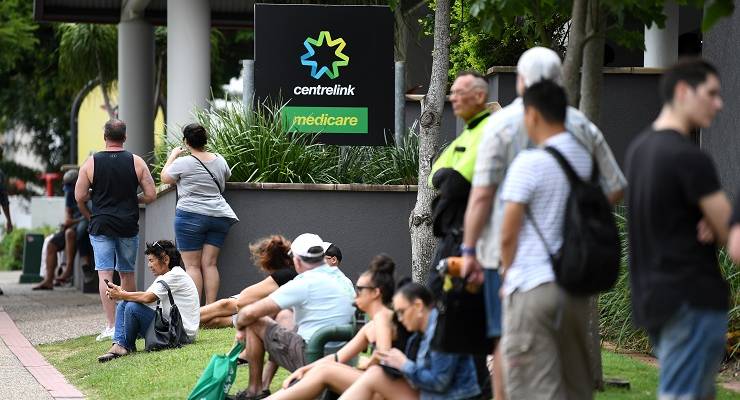
The COVID-19 crisis is changing the way we live and how our economy works, and that looks set to be the case for an extended period. The crisis also requires new thinking about the role of the state in a liberal democracy.
We are already seeing new experiments to refashion liberalism — often in surprising ways that transcend traditional ideological divides.
We have seen a conservative government in the United Kingdom provide an 80% wage subsidy to private-sector firms up to a relatively generous cap.
We have seen a conservative government in Australia — one that has made scolding over “debt and deficits” the centerpiece of its political brand —providing a $130 billion wage-subsidy package.
And it has even worked cooperatively with the Australian Council of Trade Unions to fashion the JobKeeper package and to make changes to workplace laws.
Those measures are likely to be temporary, but even once a vaccine is widely deployed and this particular crisis is over there will no doubt be pressure to redesign for the 21st century the liberal economic model of the last 30 or so years.
Two broad options around work have already been discussed in light of globalisation and automation: a universal basic income (UBI) and a jobs guarantee. The COVID-19 pandemic has further highlighted how fragile work can be in a radically interconnected world.
The wage subsidies that are part of packages in the UK, Australia, the United States and a number of western European countries are not UBIs in the traditional sense. They are generally more targeted at specific workers in specific firms hit hardest by the pandemic.
But they are wage-replacement schemes.
Spain has already announced that it intends to enact a true UBI after the crisis, with their minister for economic affairs stating, “We’re going to do it as soon as possible. So it can be useful, not just for this extraordinary situation, and that it remains forever.”
It’s too early to know what that might look like, but may get some idea from similar pitches — such as 2020 Democratic primary contender Andrew Yang’s plan to provide every American (including the very wealthy) with a US$12,000 per annum “Freedom Dividend”.
A jobs guarantee, by contrast, would involve the government ensuring that there was meaningful and productive work for anyone capable of performing it.
That might involve work on government-led infrastructure projects, environmental remediation like cleaning up beaches and waterways, or a range of other socially productive uses of labour. Programs like this formed a key part of the US government’s response to the Great Depression, the New Deal, through the Works Progress Administration.
It is important to distinguish between what is a good policy response during the crisis, and what will make for good policy after the crisis.
Right now, replacing income is key. This pandemic is an economic challenge the likes of which we have not seen in the modern economic era. The 2008 financial crisis involved large demand shocks. People didn’t want to spend money and that meant others didn’t want to produce, which gave them less money to spend, creating a vicious downward spiral in economic activity.
It also involved a massive disruption to the proper functioning of financial markets. The Great Depression had similar features.
The COVID-19 crisis involves both demand shocks (like those of 2008 and 1929) and supply shocks. Significant parts of most economies have shut down either by government mandate (think restaurants, tourism, or sporting and cultural events) or because people understand that close physical contact is too risky.
Worse still, these supply shocks can spill over into demand shocks as a recent paper by four leading economists shows (see what an academic presentation during a lockdown looks like). The correct policy response is something like the UK government’s wage replacement scheme. The Australian scheme is directionally correct, but too small.
A jobs guarantee would make little sense right now because we want people not to work in many circumstances, to prevent the spread of the virus.
One thing that wage replacement in the present crisis shows is how expensive a UBI would be. The UBI Center (a think tank that provides open-source tools that allows one to assess various UBI proposals) calculated the cost of Andrew Yang’s “Freedom Dividend” as being US$2.8 trillion per annum, based on the 236 million adult citizens in the US. That’s more than the entire federal budget. Even a relatively modest, say, AU$20,000 a year UBI in Australia would be more than our total budget.
A UBI that is truly universal is prohibitively expensive. So, while wage subsidies that have elements of its features are right during the COVID-19 crisis they won’t be affordable afterwards. In addition, a UBI in normal times does not provide the meaning, sense of purpose, and social connections that a job does.
In short, a job is about more than a pay cheque.
Post crisis we are better served by a jobs guarantee. This still involves a fairly dramatic rethinking of liberal economic orthodoxy, but automation, globalisation, and the possibility of another pandemic make it an important and necessary change.
If the income generated by a job in a jobs guarantee program were, say, 90% of the minimum wage (in a country with a reasonable minimum wage like Australia), then it would encourage the private sector to keep people where possible, but create meaningful alternative options for those who can’t find work. Long-term, that’s a better plan.
The other great long-term challenge that we face — one that will still be there post crisis — is how to address climate change in a meaningful way.
We have advocated for some time now the Australian Carbon Dividend Plan, where a $50 per tonne tax is placed on carbon emissions and all of the money generated is returned evenly on a per-capita basis to all voting-age Australian citizens. That would put $1300 per annum into the pockets of every such person.
Now that is meant to compensate for the increased costs of goods and services because of the carbon tax while preserving incentives for behavioural change, but the average household would still be $585 a year better off after the price increases.
And because the dividend is the same for all citizens, those at the lower-end of the income distribution do even better on net — $1,305 a year better off for the bottom 20% of households. If they lower their carbon footprint they would do better still.
That’s a relatively small basic income relative to, say, Yang’s Freedom Dividend. But it does address the other pressing challenge of our time, climate change, which has understandably received less attention during the pandemic.
Right now, replacing people’s incomes is critical to ameliorating the devastating economic effects of the COVID-19 crisis. But when the crisis has passed, income replacement of various kinds — especially a UBI — will no longer be the appropriate policy.
But the crisis and the government’s response will likely prompt new thinking about the role of the state in a liberal democracy.
Some of that thinking has to be about how best to get through the pandemic and its economic aftershocks — and in that case largescale wage-replacement, or even some form of semi-universal basic income, seems like the most effective and appropriate response.
But some of it needs to be future-oriented, and focused on a post-pandemic world.
And in that world, a jobs guarantee and a carbon dividend are two new things that governments could do to protect the economically vulnerable — and the planet — in ways that are truly sustainable.
Rosalind Dixon is a professor of law and director of the Gilbert +Tobin Centre of Public law. Richard Holden is a professor of economics at UNSW Sydney.









An Universal Basic Income is *not* prohibitively expensive in any way.
A tiny impost on all financial transactions could pay for all the requirements of an equitable society.
A jobs guarantee would provide an income from an occupation provided by a third party, not necessarily one to which the individual is suited to, nor desirous of: An UBI would permit for a greater freedom for a person to engage in whatever activity is most appropriate. Some, a small number, might intitially be tempted to ‘bludge’ on the system but as experience and basic psychology indicate, the vast majority would soon turn to doing “something useful” with which to occupy themselves. Goodness, they might even start doing something valuable for the community of which conventional, market led, economics is entirely unaware.
Written as this is by an academic Lawyer and a conventional Economist, it smacks of a failure of understanding of fundamental human motivations by both of them.
The circles in which they move may be motivated by greed for personal acclaim and material gain, but those things are less common amongst the hoi polloi than they might imagine.
If the professors would care to expand their horizons, observe the actual activities of the less elevated in the community and apply a modicum of logical thinking to those facts, then they might just recognise that, for those in positions of relative wealth and priviledge, the wellbeing of the commoner is the foundation upon which all of their good fortune is dependent; it always has been, and will most likely always be so.
An UBI would raise all of us from the necessity to toil at the whims of others solely to exist and enable the more creative and focussed minds to expand and to benefit the communities in which they live. In so doing, it would also provide security and wellbeing for those who, for whatever reason, are unable to fend for themselves.
A ‘Jobs guarantee’, apart from being another bureaucratic impost on the community, would further empower those with the means to provide employment at the expense of the employee as well as providing more opportunity for the government of the day to further control the activities of its citizenry and to manipulate the political system to their own advantage.
The simplicity of an UBI and the reduction of the costs to health services, homeless provision, criminal behaviours etc. simply by providing a livable income to the less advantaged etc. more than paid for itself in the Canadian experiment of recent years.
Exactly Rolly.
“UBI in normal times does not provide the meaning, sense of purpose, and social connections that a job does.”
There it is, in black and white, the fundamental misunderstanding of human psychology that suggests paid employment is necessary for ‘meaning’ in life.
Utter crap. What is more likely is that people will find real meaning, probably in work that inspires them in work that isn’t BS jobs, as David Graeber so successfully covered.
Economists think that meaning comes from paid employment. Mostly, for those of us not producing real things, employment is the thing you do to enable you to live so you can find meaning in other aspects of your life.
And the economic response being too small, pretty sure that conflicts with what Prof Holden was saying two weeks ago.
Try to keep up!
“The more creative and focused minds” would find some beneficial way of using the abundant leisure, sure.
What about the non- creative and non- focused minds?
There would probably be far fewer of them.
With fewer worries on how to merely survive without doing unnecessary and mind stultifying work at the behest of some rentier they would have more mental and emotional time to allow their natural talents to evolve.
Those who are non-creative and non-focused are a danger to others anyway and are best kept away from the workplace.
A jobs guarantee? Is that like work for the dole?
Sounds rather more like “Waged Slavery”
Excellent for keeping the serfs in order.
“… a UBI in normal times does not provide the meaning, sense of purpose, and social connections that a job does.”
It depends what you do with it. I know lots of creative people who would use a $20,000 pa UBI to create music, art, literature, all those projects they’ve never been able to run with because their low-paid service jobs take up so much of their time. The result would be some great new work we would all benefit from.
I’m skeptical about a job guarantee, because I can see it quickly turning into a version of Work for the Dole, ie people being forced to do weeding or other make-work schemes. Much better to give them a UBI and let them decide how they’re going to spend it – perhaps on training for a job they’d really like to do.
As I waded through this piece it became more & more obvious that it was written by people with no notion of the real world – slabs of boiler plate eoconcratese – “proper functioning of financial markets”, deliberate euphemism “the liberal economic model of the last 30 or so years” – none dare call it NEOLIB? – and evasion, eg to claim that 1929 & 2008 financial crises “involved large demand shocks – no, it involved simple, criminal cupidity.
However the real burr under their collective saddle came just over half way through – straight out misrepresentation “UBI that is truly universal is prohibitively expensive” followed by the magisterial homily for the unwashed “UBI in normal times does not provide the meaning, sense of purpose, and social connections that a job does. “.
Sez who? Apart from cloistered academics.
As noted by others above “A jobs guarantee, by contrast, would involve the government ensuring that there was meaningful and productive work for anyone capable of performing it” is work for the dole which is most definitely not “from each according to their ability, to each according to their need”.
Not quite like last week’s Toby Jug B/S but of equal value, ie none.
Yes that statement “proper functioning of financial markets” jumped out at me too Agni! Improper more like it!
Be clear! Our Kleptocracy has loads of money to fund good causes.
Class A – utter waste of Budget tax expenditures on giveaways to the filthy rich:
(a)….owner-occupier cgt exemptions…………………………………..$74 billion
(b) ….extra owner-occupier marginal tax rate c g discount ……..34 billion
(c) ….c g tax discounts for indiv . trusts ………………………………….9.6 billion
(b) ….fossil fuel subsidies…………………………………………………….10 billion
(c) ….borrow from RBA not filthy rich …………………………………..18 billion
(d) ….mining industry subsidies. …………………………………………….2.5 billion
(e) ….negative gearing…………….. … ……………………………………….3.7 billion
(f) ….superannuation tax concessions …………………………………..33 billion in FY17
(g) ….fuel tax credits…………………………………………………………….6.2 billion
(h) ….excessive tax breaks for over 65s……………………………………1 billion
(i) …. undeserved cash conversion of excess imputation credits…..5.6 billion
(j) ….general Cwlth industry assistance ……………………………….…12 billion
(ja) PC Trade and Assistance Review 2017-18 – much understated for mining, much overstated re tariffs before netting
Class B – bloated subsidies of private profit:
…¢…First Home Vendors Grants……… … ………………….1 billion
…¢…child-care rebate (incl to states)……………………….8 billion
…¢…private education…………………………………………….9 billion
…¢…[latest]drug costs increased by FTAs………….3 billion
…¢…private health subsidies………………………………….12 billion
…¢….incl Private Health Insurance Rebate………………..6.5 billion
…b5…taxes on fast foods + subsidy on fresh food……..3.4 billion
Of course, that completely excludes the fabulous private plunder of us unassisted by subsidies. Housing cost, for instance.
Class C – revenue given away but recoverable
…¢…1.5% company tax cut from FY18…………………………2 billion
………….(desired gifts to transnationals: $65.4 billion FY18->FY28)
…¢…transnational tax evasion……………………………8.4 billion
…¢…reverse income tax giveaway………………………..3.4 billion
…¢…GST exemption on financial supplies ………………….3.4 billion
…¢.. family tax benefit…………………………………19.3 billion
…¢.. redundancy payments concession ………………………2.6 billion
…¢.. generous tax breaks for over 65s……………………..1 billion
…¢.. stop oil and gas projects being royalty-free……..$1 billion
Class D – better policy:
…¢.. increasing taxation to OECD average………………$85 billion extra
…¢.. less Indigenous imprisonment………………………1 billion
Class A+B+C+D Total: 208 + 43 + 41 + 86 BILLION = $378 BILLION ($378,000,000,000) ANNUALLY. More they have, more they want. Having been able to take that off us so successfully, why be surprised that the ruling clique expects consumers to pay the coronavirus subsidies that have largely gone into business pockets?
On fire Raven!